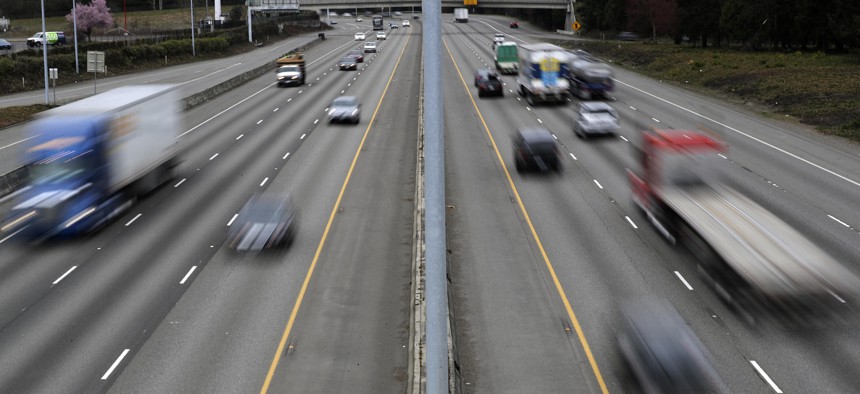Trucking Group Confident Gas Tax Hike Could Clear Congress With Trump’s Support

Cars and trucks travel on Interstate Highway 5 near Olympia, Wash., Monday, March 25, 2019. AP Photo/Ted S. Warren

Connecting state and local government leaders
Lawmakers could release infrastructure legislation in the next six to eight weeks, the group's president and CEO also says.
A federal gas tax increase to pay for transportation projects could gain enough support to win approval in Congress this year if President Trump champions such a measure, the head of the nation’s largest trucking industry trade group suggested on Wednesday.
“If the president puts his full weight behind this and wants infrastructure and wants real money to fund it, I am confident that the votes are there, both chambers, House and Senate,” Chris Spear, president and CEO of the American Trucking Associations said on a call with reporters.
The group has proposed a new 20 cent per gallon fee, phased in at 5 cents per year over four years, on gasoline and diesel at the “terminal rack”—that’s where refiners sell fuel to wholesalers and gas stations. Under the plan, the fee would be indexed to inflation and gains in fuel efficiency, with a five percent annual cap on increases.
This would generate about $340 billion over a decade in new revenue to help pay for highway infrastructure, the group estimates.
Currently, the federal tax on gasoline is 18.4 cents per gallon, the same as it was in 1993. The tax on diesel is 24.4 cents per gallon. These fuel taxes are not indexed to rise with inflation.
Spear also said he anticipates that legislation drafted by the tax-writing Ways and Means Committee and the Transportation and Infrastructure Committee in the Democratic-controlled House will be introduced in the coming six to eight weeks.
Those committees, he said, want to see a bill advance to the House floor as early as June to give the Senate the remainder of the year to take up the legislation.
The American Trucking Associations is launching a new media and advocacy campaign that includes television commercials, making the case for new federal infrastructure investment.
Trump throughout his time in office has indicated that he backs significant new spending on the nation’s infrastructure. But a plan his administration came up with and released last year fell flat in Congress. It called for $200 billion in direct federal funding.
The administration’s proposals have focused not only on highways, but also other infrastructure like waterworks and rural broadband.
How to fund any sweeping public works package is a main sticking point among lawmakers.
And the American Trucking Associations effort is not the first push in recent years for upping taxes on fuel. Last year, the U.S. Chamber of Commerce and other groups came out in support of a 25-cent increase and indexing the tax for inflation.
Key Republicans in the Senate have voiced skepticism and outright opposition during Trump’s term about the idea of hiking taxes on gasoline, and the political calculus involved in doing so could become more complicated as the 2020 elections approach.
Meanwhile, some lawmakers have said they want to see a migration away from a gas tax if an infrastructure plan does move forward.
But Spear said his group’s view is that mileage-based charges seen as an alternative to taxing fuel are “simply not ready for prime time” and that it will be another eight to 10 years before the technology to support the fees is ready for full deployment.
There have been state mileage-based fee pilot programs in recent years, including one launched in 2015 in Oregon.
“We believe the gas tax is the most immediate, conservative way to fund infrastructure over the next ten years,” Spear said.
Bill Lucia is a Senior Reporter for Route Fifty and is based in Olympia, Washington.

NEXT STORY: How a Highway Widening In This City Could Lead to Congestion Pricing





